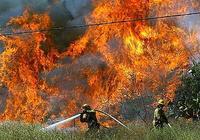-
Privacy, cost concerns check drive for more surveillance cameras

Law enforcement agencies in cities across the United States are campaigning to increase surveillance on city streets, impressed with the effectiveness of video surveillance in helping the Boston Police identify the two suspects in the Boston Marathon bombings. This campaign to expand law enforcement’s surveillance power is likely to run into stiff opposition, as Americans have proven suspicious of allowing the government powers which would infringe on privacy. Expanding surveillance networks also costs money, and these are tight budgetary times.
-
-
Iowa sex offenders allowed to keep guns
A law enacted two years ago has made it possible for more than fifty sex offenders in Iowa to apply for gun permits. Sheriffs and some lawmakers are uncomfortable with the situation, but advocates for sex offender rehabilitation say such offenders are not necessarily dangerous criminals.
-
-
California braces for out-of-control wildfires

The lack of precipitation over the past two winters has California and federal officials concerned about the impact wildfires could have in the summer months. California has already recorded 845 wildfires this year, a 60 percent increase compared with the average for the previous five years.
-
-
Central Washington State proposed for a UAV research and testing site
The FAA Modernization and Reform Act of 2012 enacted by Congress calls for establishing six unmanned aircraft system research and testing sites in the United States. A consortium of Washington State-based organizations will soon submit the final section of a proposal to site an unmanned aircraft system research and testing facility in central Washington. If successful, the proposal to the Federal Aviation Administration (FAA) will result in the FAA naming the Pacific Northwest Unmanned Aerial Systems Flight Center as one of six U.S. testing facilities later this year.
-
-
California considering lead ammo ban

Health and environmental advocates are trying to make California the first state to enforce a statewide ban on the use of lead bullets for hunting. The U.S. Geological Survey (USGS) estimates that there are 400,000 pieces of lead shot per acre in wild game territory which can be eaten or washed into rivers and waterways. The USGS also says that 60,000 metric tons of lead fired off last year is the second largest use of lead in the United States behind batteries. The CDC reports that lead is so abundant in meat harvested through hunting, that pregnant woman and children should never eat it. The NRA opposes the ban, saying it could possibly the end of hunting in California.
-
-
Atlanta losing DHS area security grant money
The city of Atlanta is losing DHS grant money used to strengthen the city’s ability to protect against a terrorist attack. Despite being home to recent high profile events such as the NCAA’s Final Four, federal records show the amount of money allocated to Atlanta through urban area security grants has dropped from $13 million in 2010 to $5 million last year.
-
-
Hawaii debating creation of a state homeland security office
Lawmakers in Hawaii are discussing the state’s Department of Defense the idea of creating a new homeland security office with. Supporters of the plan say having a DHS office will help improve efforts to prevent terrorist attacks in Hawaii. Critics are not so sure.
-
-
DHS-funded police gear blurs line between crime-fighting and war-fighting

DHS is funding the purchase of military gear by Bay Area police departments. Critics of the program say the money allocated for the war on terror is blurring the line between local law enforcement focusing on crime fighting and soldiers fighting in an enemy war zone.
-
-
Federal security grants to Kansas City cut
DHS has removed Kansas City from the list of cities receiving DHS grants, which means that the city will now have to rely on its own resources to train local law enforcement on how to predict, spot, and react to terrorist activities.
-
-
DHS formula grants to states drop dramatically
DHS money allocation o money to states for first response and disaster recovery has dropped significantly. DHS formula grant program was at an all-time high of $2 billion in 2003, but last year the program had only $294 million. As a result of the sequester, another 5 percent will be cut from the program.
-
-
Giant snails invade Florida

South Florida has found itself in battle with a destructive invasive species known as the giant African land snail. The snail can grow as big as a rat and can eat plaster.
-
-
Mississippi to add terrorism to crimes for which death penalty may be sought

The state of Mississippi is considering adding terrorism to the list of crimes for which the death penalty could be applied if a victim is killed during an incident. Constitutional lawyers say the law is not likely to be used much since significant acts of terrorism are typically prosecuted as federal offenses. They also say that it would not be bad idea for the law to cover a renewal of Ku Klux Klan-style killings in the future.
-
-
New Jersey to launch emergency, preparedness awareness campaign
The New Jersey Office of Homeland Security and Preparedness is currently looking for a PR firm to help it launch a multifaceted awareness campaign. The campaign, worth about $4 million over three years, would aim to increase the level of emergency awareness and preparedness of residents, businesses, and communities in New Jersey.
-
-
Farm states pass bills to protect farms from activists, whistle-blowers
In an effort to stop animal rights activists from recording acts of animal cruelty on farms, lawmakers in twelve states have proposed or enacted bills which would make it illegal secretly to record livestock farms or apply for a job at a farm without disclosing ties to animal right organizations.
-
-
L.A County to turn rain water into drinking water
Residents of Los Angeles County know that on the rare occasion that it rains, staying away from the beach is a good idea. Runoff from rain typically brings heavy metals, pesticides, cigarette butts, animal waste, and other pollutants into the streams and rivers which go into the Pacific Ocean. Now, local officials are getting together to find a solution to the water pollution and water scarcity, with an ambitious plan to make the runoff water drinkable.
-
More headlines
The long view
States Rush to Combat AI Threat to Elections
This year’s presidential election will be the first since generative AI became widely available. That’s raising fears that millions of voters could be deceived by a barrage of political deepfakes. Congress has done little to address the issue, but states are moving aggressively to respond — though questions remain about how effective any new measures to combat AI-created disinformation will be.
